Jiří Pergl, Enterpreneur, Czech Republic
Within the scope of his One More Day For Children organization, Jiří Pergl has traveled to Kenya for his second time and through the means of his report, you have the perfect opportunity to observe how successful he is in helping local children infected with AIDS.
Few people understand why it is so important to help children in Kenya. Why not Somalia, Chad, Kongo, Zaire, or Ethiopia? I will give you a simple answer. In 2007 extensive fighting between the tribal groups of Kikuyu and Luo took place because of the presidential election. Many people died. There was practically no TV coverage of this here in Czech Republic, only a brief piece with an inaccurate data. CNN talked about 50 thousand people who were killed during the unrest. Locals claim that the number is many times higher. As a result, a lot of children became orphans, unless of course, they were killed. Nobody is able to say how many people lost their livelihood during this period. Thousands of cases are undocumented. Murdered families in villages, burned down houses and churches, raped women and so forth abound. Locals claim that there are more than 200 thousand dead as of 2010, and they are still counting. Let us return to current state of affairs which is not all that different from 2007. September 2009 – in the region of Doldol where most of my activities take place. No TV has ever broadcasted what happened there. Only the locals know, and nobody has any desire to deal with it. People from one village set out to massacre a neighboring settlement. Over 100 brutally murdered only because no rain had come for fifteen years, and they had no food. The killers murdered their neighbors with automatic weapons so they could take their livestock and feed their own children. Were remaining children from slaughtered village (mainly girls between the ages of four to twelve) immediately forcibly married to wealthy men from a nearby settlement, circumcised, and sexually abused? OF COURSE! Damn…! This is terrible…. But this is not all! They were sold by survivors from their own village to get back their cows and sheep. So a four-year-old girl was married to 30-year-old man in return for 10 cows!!! What about little boys that survived? They ran for the bush, to the jungle where animals roam. Trying to survive among lions and monkeys in the wilderness. Many of them were devoured by lion packs, some were found half-eaten by monkeys. Oh yes, with faces nibbled off by baboons… I want to help the remaining children, all of them. By the way, one of the girls in our adoption program, Soina Leiknait, is a survivor from the village. I am not telling you all this to scare you off of a possible visit to Kenya, however there are a number of people who are telling me, “I have been to Kenya and it’s all right there.” They forgot to add that it was with a travel agency in some national park accompanied by a guide. And when they went alone, they would go to areas where wild animals live in peace and everything is fine. I understand that going to those God-forgotten places like Doldol (and further North towards Somalia) is rather uninteresting for them but… We are talking about something entirely different here. To make a long story short, after six months I returned to Kenya to help the sick, abused, hungry, and abandoned children. There is already a specific project in place. Our plan is to register, with the local authorities, 23 children that are included in our program of adoption, establish a bank account with Standard Chartered bank, set up a furnished office in Nanyuki, and fill out all the forms pertaining to the children. I am also going to pay a visit to an architect to get the full drawings needed for the erection of a brand new children’s home, including a school for 60 kids. Furthermore, I am going to visit those 23 kids and give them presents from their adoptive parents in the Czech Republic and gather some information regarding the use of our new account needed for future payments for school expenses, electricity, and rent. I will also deliver food supplies from the nearest large cities of Karatina and Nanyuki. Not to forget a children’s home in Nanyuki where sweets and DVD films are eagerly expected. Why not more stuff? Because they no longer need so much. We managed to spur the local government into action and they are supplying them with more money to purchase food and other life necessities. Out activities at this place are gradually decreasing but we have already adopted 3 kids there and plan further to adopt 3 more. From the money collected we also want to purchase food for another 15 struggling families with children. A visit to those 12 children from our last reportage is coming up as well, they survive without parents in a single derelict shack. Then we made a stop at the office of Doldol mayor and placed an official request for a donation of a piece of land that will be used to build our children’s home. A visit to the local people of influence who can lend a hand is a must, and we must not forget to contact Kenya’s newspaper.
12.1 Arriving in Nairobi
This is about the events that awaited me on my trip. My report documents how it all actually went.
The trip to Kenya is quite difficult unless you are willing to pay an exorbitant price and fly directly from Prague. A visit to a couple of German providers, however, will score tickets for some €500. The departure is from Munich with the flight being via Istanbul with seven hours of waiting between flights.
The scheduled arrival of this flight to Nairobi is always in the early morning hours (2AM). Waiting for me were Partick and Cyrus, our old friends from the previous reportage, who are assisting me here with the foundation. After a short nap comes the visit to Dr. Martin, who helps pregnant women who are HIV positive. We brought various medications from the Czech Republic, medication that people who contribute to our fund donated. Martin was astonished but regrettably his mother died the very same day so his pleasure was lessened to say the least. He informed me of a shocking fact – the number of HIV-positive mothers has been increasing at a rate of 50 a month, an increase of 300, from 1537 to 1837… Horrible. He also told me that 50% of young people in Nairobi are HIV-positive, an unbelievable number.
In the evening we had a meeting with Hellen and our lawyer, Elizabeth Njorge. It happened at the restaurant of my favorite hotel—Central Park. We had to discuss our program and set up meetings for the next day. After that, just sleep, so badly needed…
13.1. Nairobi
A visit to the LG service center awaits me the first thing in the morning. Why? A TV set we bought for the children in Nanyuki had broken down after only two months. Warranty? Here? Don’t be silly! They will not replace the set. Cyrus took the TV to a service center in Nairobi. That was at the beginning of October. The part needed should have come from Dubai. Now it is January and our TV is still idling in the service center. So I got upset again and had to be insistent. They will call Friday the 15th, so they told me. The TV should be repaired by then so we shall see. Off we go to setting up our administration, buying various folders, office supplies and then getting behind the desk and starting work. Our lawyer familiarized me with the regulations I need to know to get the process of adoption going and everything else necessary to making the Kenyan government happy and ensuring no problems come our way. Dead-tired we finish at 8 o’clock and go to sleep. In the morning we head for Nanyuki province where our organization operates.
14.1. Leaving for Nanyuki
It’s 8 in the morning and we are heading for Nanyuki. There is an important ahead stop in the town of Karatina. The biggest food market happens to be there, one claimed to be the cheapest. We needed to buy food for twenty-three adopted kids with money collected from OMDC to purchase food for fifteen families from the slums of Mount Kenya province.
I have no idea how we did it but we fitted the 1,140 kg of food and all the suitcases into our rented Toyota Prado. The one of the things that differentiates us from big foundations is that I use the money people donated only directly on the children themselves. I don’t use it to cover all the costs like flight tickets, car rental, gas, hired help and their food, my food. When it comes to adopted children, the situation is such that the government keeps 20% of the monthly payment (money you send them monthly); it is used for taxes and other expenses. Expenses mean everyday, ordinary care for the children – buying food, doctor’s visits, accommodation, necessary transportation, bringing needed school supplies (school bags, other supplies, and even beds for some). There is a cost to all of this of course.
After loading the food, we leave for Nanyuki. I plan to stop at Patrick’s village. Why? I want to visit the family of that 18-year-old boy from our first Kenya video who hanged himself (if you haven’t see the first film and so far have nothing to do with our foundation, you can visit my page www.expedice-world.cz where I visit various God forsaken corners of this planet. It is about nature and people, with beautiful scenery from Kenya all accompanied by wonderful music). The unfortunate boy committed suicide and the story leading to it is hard to believe. Upon our first visit to the village we set up an innocent competition among the local youth – whoever first brings a big banana spider, to be captured on film, wins 500 Kenyan Shillings – around 10 USD. This region is so poor that this money amounts to a small life-start. One of the local boys brought us a banana spider, we shot our video, payed the winner, and left for Nairobi. A little later we learned that the other boy also caught a spider but was too late to bring him to us. He was so devastated that he resolved to take his own life. Needles to say we were really sorry and we decided to visit his family on our next visit and today we will.
The road, if you want to call this a road, leads towards Mount Kenya. 5 km from the main road Patrick asks us to stop. Here it is. A small corral occupied by 1 cow and 2 goats, a tiny wooden deteriorated house sits in the middle. An older gentleman steps out of this dwelling and greets us kindly. This is the father of the unfortunate boy. We chatted for a while and I told him how sorry I was and gave him 1000 Shillings. Tears started pouring out of his eyes and he hugged me with words “God Bless” and “assante santa.” Than two brothers of the boy came and shook my hand. They explained that Joseph was an introverted person, difficult to understand, and I should not blame myself for his unfortunate suicide. After saying goodbye we leave for the town of Nanyuki to get to our original task. Our first visit is to Hellen’s office that she had in the meantime rented out to our OMDC. 6,000 Shillings (1500 Czech Crowns) a month – not bad, but the office needs to be furnished. We buy a printer, cartridges, office supplies and furniture (chairs, cabinets, folders, staplers, accounting books, notepads and lots of other stuff). I also brought a Notebook PC with the English version of Windows XP from the Czech Republic.
And then a short trip to a small cottage resort where we settle and where we spend the following nights. Hellen knows the owner, so we get one night for 500 Shillings. Do not get the idea that everything is cheap here. I haven’t mention what most things cost here yet. This resort charges 4,500 Shillings for a single bedroom (1,216 Czech Crowns) and this is by no means a standard hotel. It includes a bed, a shower that spews either boiling or freezing water along with precarious wiring for 220V electricity. In Europe this would be very substandard for the money. A three-star hotel in Nairobi (1-2 stars compared to European standards) costs from 900 to 1,900 Czech Crowns. Don’t even think about what the Hilton costs! Just to give you an idea about local prices: 1 beer – 60 Czech Crowns, 1 liter of petrol 28 Crowns, Fanta 3dcl – 14 Crowns, spaghetti bolognese – 82 Crowns, the charge for the use of an ATM – 240 Crowns (with a withdrawal limit translating to 10,000 Crowns) renting a vehicle – 1,200 Crowns a day for a small one, while a larger car with the large trunk we need to conquer local slums will take you back some 4,400 Crowns. If you are thinking about buying a car, let me warn you, cars here are three times more expensive than in Europe. A sixteen-year-old Toyota Land Cruiser that at home you could buy for around 150,000 Crowns will cost at least half a million here. Should you decide to travel by bus, say to Matatu, 200 km away, it will come to 500 Crowns and there is around a twenty percent likelihood you will not survive the ride. This was just a short sample of what is it going to cost you, should you decide to come along.
Now comes the physically demanding part, distributing 1,140 kgs of food and carefully sorting it into 38 plastic bags.
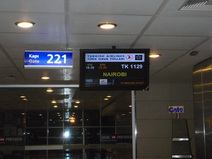 |
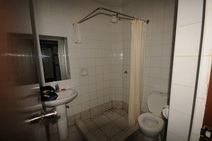 |
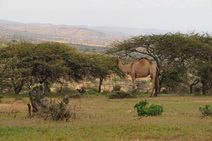 |
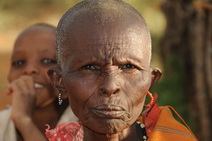 |
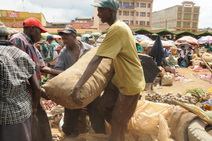 |
 |
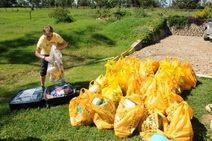 |
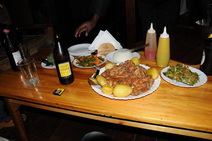 |
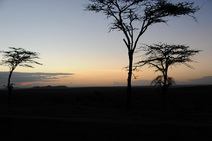 |
